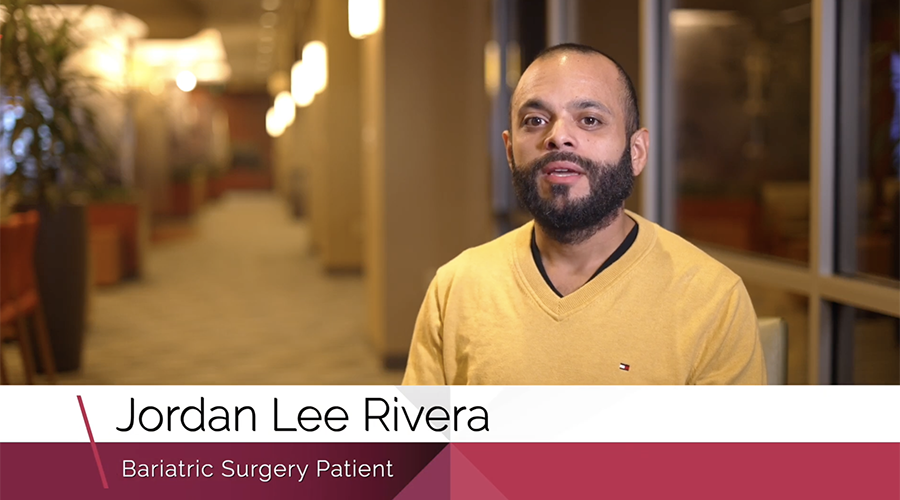This is your one life.
Choose your path forward.
Improve your quality of life and do it your way.
At Garnet Health, we specialize in minimally invasive bariatric surgeries, including gastric bypass, sleeve gastrectomy, and gastric banding. The procedures are performed using state-of-the-art techniques that result in smaller incisions, reduced scarring, and shorter recovery times, allowing you to get back to your daily routine with greater comfort and confidence.
Our expert surgeons and care team are dedicated to ensuring that your weight loss journey is not only effective, but also safe, supportive, and personalized. Whether you’re just beginning to explore surgical options or are ready to move forward, we’re here to help you make informed decisions and guide you through every step of the process.
Request a consultation

Begin your journey of transformation with us.
Find out if you qualify for weight loss surgery.
Take the quizWe want to see you succeed.

Hope for the future
With the help of Garnet Health Medical Center, Jordan lost 170 pounds and gained hope for his future. Listen to his weight loss story as a bariatric surgery patient.
Jordan's weight loss story
Take back control
After a successful bariatric surgery, a back injury left Kristina suffering with chronic pain and weight gain. Learn how she was able to take back control of her life with the help of Garnet Health's Bariatric Surgery and Obesity Medicine Management Program.
Kristina shares her experienceFrequently asked questions
To help ensure the best possible outcome from your weight loss surgery, the Garnet Health team offers personalized education and support—before, during, and long after your procedure.
Bariatric surgery should be considered after conservative treatment of morbid obesity including diet, exercise, drugs and behavioral modification has failed. Surgery for morbid obesity is the only successful method of long-term weight reduction, as well as, significant improvement or complete resolution of co-morbidities (associated diseases – like Type 2 diabetes, sleep apnea, cardiovascular disease).
Patients seek out Garnet Health Medical Center’s Bariatric Surgery Center of Excellence Program after failing to lose weight through traditional means or when attempts at non-surgical treatment for morbid obesity have failed. Some have already begun researching the idea of bariatric surgery via the internet or other means, and others have heard from existing patients to attend one of our free informational seminars.
At Garnet Health Medical Center, we follow the National Institutes of Health (NIH) guidelines and criteria for determining whether an individual is a candidate for Bariatric Surgery. Those guidelines indicate the following:
- Body Mass Index (BMI = weight divided by height in meters squared) of ≥40 (@ 100 pounds overweight), or ≥ 35 to 39.9 with at least one other obesity-related disease; i.e., Type 2 diabetes, sleep apnea, severe osteoarthritis, cardiac disease including high blood pressure and high cholesterol, polycystic ovary disease, etc. Those with a BMI ≥ 30-34.9 can be considered for a gastric Lap-Band ® only and must also have at least one other obesity-related disease to qualify for bariatric surgery.
- Must have tried and failed conservative treatment and be overweight for a minimum of 5 years.
- Must be 18 years of age or older.
- Must be mentally prepared for the procedure without having an eating disorder such as bulimia.
Results at Garnet Health Medical Center correspond to the national average. In the majority of cases, bariatric surgery patients lose anywhere from 45% to 83% of their excess body weight and improve or resolve 90% of their obesity-related health conditions within one year post-operatively.
There is always a certain degree of risk involved with any surgery. At Garnet Health Medical Center, all bariatric surgeries are performed as minimally invasive, laparoscopic procedures, which decrease risks and complication rates. Laparoscopic gastric banding is ten times safer than gastric bypass, with a mortality rate of 0.09%. The laparoscopic sleeve gastrectomy mortality rate is also low at 0.05%.
Some of the more common side effects after bariatric surgery are:
- Fatigue
- Surgical pain (mild to moderate)
- Nausea
- Weakness
- Light-headedness
- Sleeplessness
- Loss of appetite
- Gas pain
- Constipation or loose stools
- Emotional ups and downs
- Dumping syndrome (sugar intolerance after gastric bypass)
Pre-operative diet is also important. It is strongly recommended and sometimes required by insurance companies that bariatric surgery candidates attempt to lose five percent body weight prior to surgery. This is recommended so the liver shrinks in size, making the surgery safer, and because research has shown better outcomes for patients who have already started to lose weight prior to surgery. Garnet Health Medical Center’s bariatric dietitian educators work closely with each bariatric surgery candidate to help to achieve this goal.
At Garnet Health Medical Center, all bariatric surgery patients are required to remain on bariatric clear liquids for a few days and then advance to a bariatric full-liquid diet, including protein shakes, for 2 weeks post-surgery. During week three, the diet varies depending on the procedure. Gastric Bypass and sleeve gastrectomy patients advance to a puree diet, and gastric band patients advance to soft solids. All patients eventually consume well-balanced and portion-controlled solid foods. The “slow, small, moist, and easy” eating techniques are critical for patients to follow:
- Set aside 30 minutes to consume each meal
- Chew food 28 to 30 times before swallowing
- Take small bites and use a saucer in place of a plate to aid in portion control
- Stop eating as soon as you feel full
- Eat all of your protein first to ensure adequate amounts before feeling full
- Stop drinking 30 minutes before eating; do not drink during your meal; wait 30 minutes after eating to resume drinking
Attempts to overeat immediately after surgery will cause the patient to regurgitate. Over time, with the gastric bypass and sleeve gastrectomy, the pouch will expand slightly and allow more food to be ingested at one time. As a result, patients must be educated pre-operatively about the difference in the rules of their stomach pouch to prevent weight regain. Moreover, it is very important that patients continue to attend support groups after surgery to learn behavior modification techniques necessary to prevent weight regain.
A follow-up is conducted at the surgeon’s office during the following intervals:
1 wk/1 mo/3 mo/6 mo/9 mo/1 yr and once per year for life. For gastric banding patients, add additional follow-ups for adjustments of the band, once every 6 weeks to 3 months within the first year.
Follow-up is also provided by the bariatric dietitian educator from Garnet Health Medical Center, as well as physical and behavioral health therapists and other physicians/ancillary staff representing the multidisciplinary approach to care at our bariatric support groups provided throughout the month.

Bariatric Wellness Blog
Our monthly blog offers practical tips on nutrition, exercise, and lifestyle, helping bariatric patients stay healthy, overcome challenges, and achieve lasting weight loss success.

Expert guidance and comprehensive support
Join one of our educational weight loss seminars.
Explore the possibilities of weight loss surgery at our educational seminars, guided by our expert team of specialists. Take your first step towards a healthier future with the tools and knowledge to succeed. Join us and let’s take that next step, together.
We encourage anyone interested in weight loss surgery to attend one of our support groups.
The Garnet Health Bariatric Surgery Support Group is for both pre- and post-op bariatric patients and is open to the general public. This will help to educate you and streamline the process. Support groups are held in a safe atmosphere where you can share any individual issues or concerns about weight, diet, and exercise.
Support Group Calendar